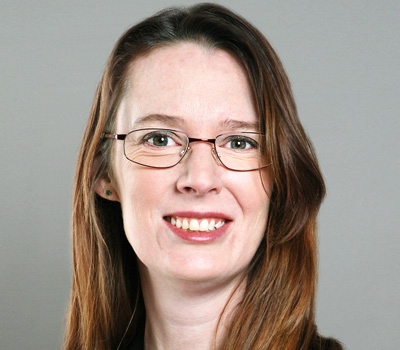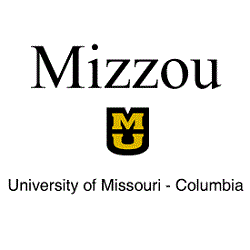Alleviating the harmful by-products of industry for healthier technological advancement
There has been a long standing belief between environmentalists and proponents of industry that environmental health and technological advancement are mutually exclusive principles. Dr. Sheila Baker of the University of Missouri is proving the flaw in this logic by bridging the gap through technological progress. Technological advancement is improving quality of life and the efficiency and functionality of the world, but we cannot afford it to come with a high price tag, such as environmental devastation. Alternatively, we do not want to miss out on the extraordinary benefits that technology provides to our society because of an inability to mitigate any negative effects. Dr. Baker's research is promising to find a necessary median between technological advancement and environmental health to ensure sustainable and healthy growth.
Dr. Sheila Baker, Assistant Professor in the Departments of Chemistry and Chemical Engineering at the University of Missouri, is using science and technology to find solutions to the missing links so that technology can and will equal progress. Technological advancement is no longer forward progress if the effects of that advancement are more environmentally detrimental than the benefits received. Carbon dioxide and a number of water-concentrated contaminants are threatening environmental health, but simply reducing output is not a viable long-term solution because to do so we must reduce industry output as well. Dr. Baker is developing new materials and methods that reduce or eliminate pollution and correct the negative effects of technological advancement. Beyond atmospheric pollution, she is investigating ways to recycle rare earth metals in electronic devices and is developing sensors for identifying and cleaning up environmental toxins.
Dr. Baker's current research projects deal with various ways to mitigate conflict between environmentalist and proponents of industry and technological advancement. In other words, rectifying differences between technology and progress.
-
Carbon dioxide is a concerning byproduct of fossil fuel burning in industrial-sized power plants. Dr. Baker is designing absorbent solid-state compounds, nanomaterials surrounded by a polymer coat, that absorb CO2 from the flue gas output of coal burning power plants by chemically specific methods. Current methods capture CO2 using compounds dissolved within water, but require immense heating costs during the regeneration step. Dr. Baker's materials avoid this cost by being easily reusable; they are inexpensive to fabricate and re-generate, and unlike competing new materials are available in large quantities and can be implemented sooner rather than later. Dr. Baker is currently working on developing efficient logistics, trying different configurations for implementing these materials into power plant facilities.
-
Dr. Baker is creating nanomaterials used in sensors that are placed in contaminated water to identify and/or degrade contaminants. These sensors are made through an energy-efficient microwave technique and provide feedback to computer systems, or work through online analysis, to degrade contaminants, effectively detoxifying the water sample. One example is gold nanoparticles used to detect mercury contamination in water, though other metal-based sensors are also being researched. Whereas current degradation agents use a photo-degradation process, Dr. Baker's materials can work in the absence of light, greatly increasing their practical applications.
-
In a collaborative process with Dr. Gary A. Baker, Assistant Professor in the Department of Chemistry at the University of Missouri and also Dr. Sheila Baker's husband, the duo has found ways to easily transform waste material into components for solar cell systems. After the waste material is transformed, it can absorb light energy and then inject an electron into solar cell systems.
Bio
Dr. Baker developed an inherent interest in science and problem solving at a young age, but was unsure how to combine her passions with an overarching desire to make a difference in the world.
While in college, one of her professors convinced Dr. Baker to work alongside her in her lab and she quickly fell in love with research. After commendable success in research, the professor introduced Dr. Baker to her graduate advisor, Dr. Frank Bright. After attending his seminar--he was a dynamic and passionate speaker--Dr. Baker decided to pursue graduate studies in his lab. After completing her Ph.D. and postdoctoral studies, she decided to focus her independent research on finding solutions that offer an equitable compromise between technological advancement and any environmental or health detriments they may pose. Research provides a median between problem solving and basic science. For Dr. Baker, it is like being the protagonist in a detective story, where research provides the clues to solving larger world problems or mysteries and the researcher must connect the dots, so to speak.
Dr. Baker draws additional motivation from the fact that she is a woman scientist in a traditionally male-dominated field. While she has many experiences in her career where gender did not seem an issue, she has had several experiences where it was blatant. Even when declaring her focus in science during college, several older men questioned her decision, asking, "What are you doing? Women don't study science! Either chose a traditional degree or find a husband." Even after obtaining her Ph.D., she experienced several instances where her male colleagues were referred to by Dr. or Professor while she was referred to as Ms. or Mrs. Determined to negate gender stereotypes, these comments lit a fire under Dr. Baker that to this day compels her to strive for success. She strives to promote positive attitudes and support for women in STEM careers. Dr. Baker struggles to maintain a balance between the high demands of family, children, and career. Something many women and men in science and engineering fields face. Women, in particular, often fear the effects that having a family may have on their career,from pregnancy woes to the ability to take time off and still remain career-productive, to biased workplace and society perceptions. Dr. Baker is working to provide mentoring and support systems for mothers in scientific and engineering careers.


